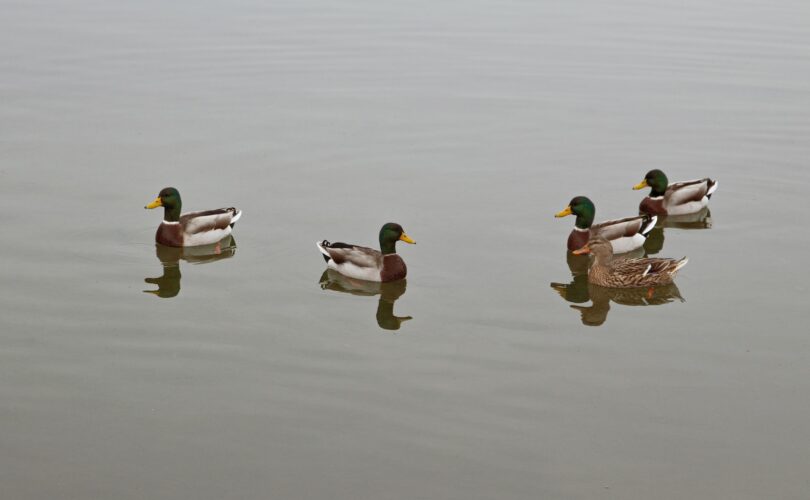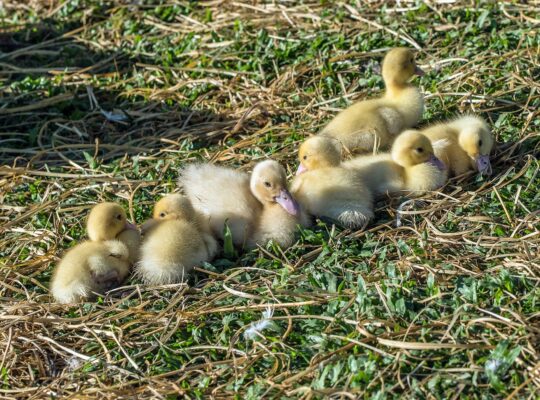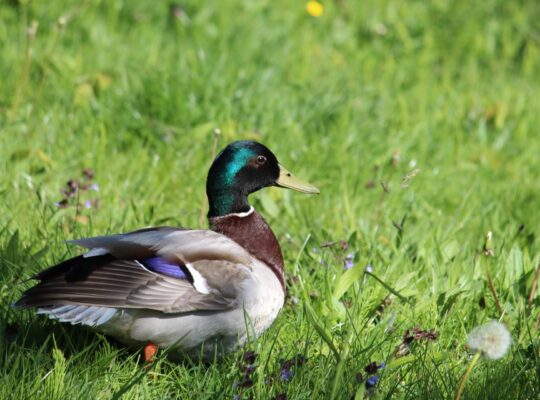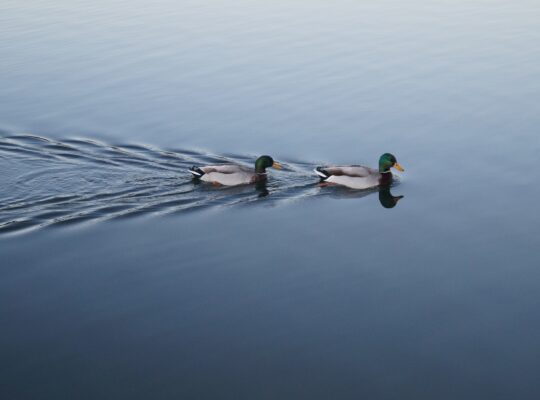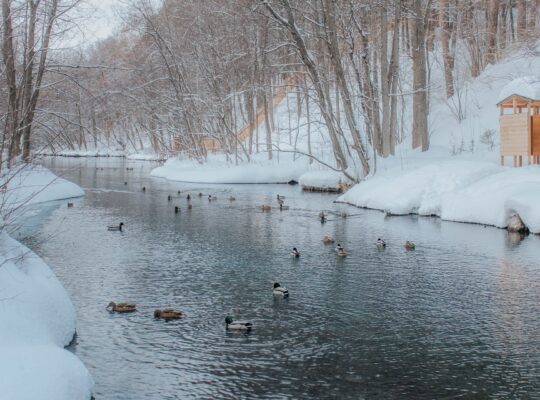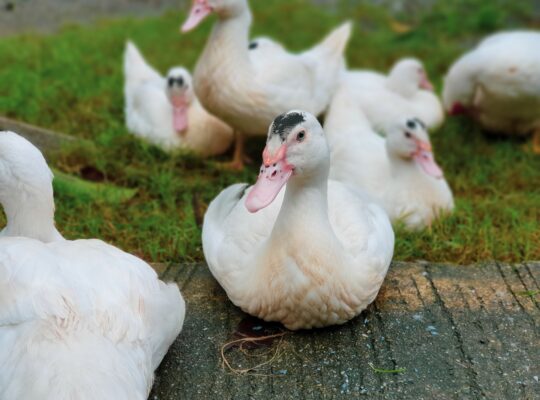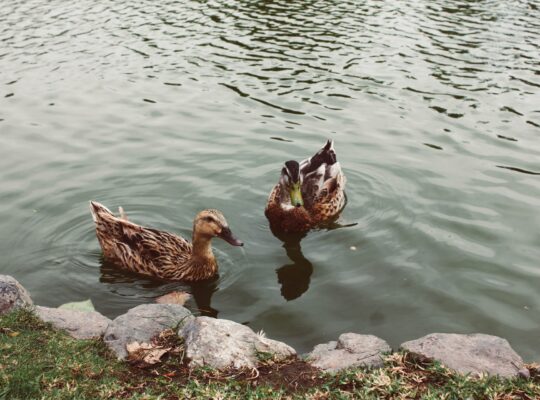Yes, ducks do poop in the water. It is a natural and typical element of their physical activities. Like many other waterfowl, ducks have adapted to live in and near water, and their excretory system has developed to accommodate this lifestyle.
Ducks have a cloaca, a single opening in their body that functions as a waste, egg, and sperm departure point. This opening at the base of their tail is utilized for both urine and feaces. When a duck wants to go, it simply contracts its cloacal muscle, which pushes the excrement out.
When ducks are in the water, their cloaca works the same way it does on land. But, since they are surrounded by water, their waste dissolves and disperses promptly. This is why you may sometimes notice brownish-greenish blobs floating in ponds or lakes with ducks. This is their feaces.
Although it may seem disgusting for ducks to defecate in the same water they swim and drink in, it is a natural and helpful ecology element. Duck poo includes nutrients and minerals that other water species, like algae and bacteria, may utilize. These organisms subsequently provide food for other animals, assisting in the overall sustainability of the ecosystem.
It is also worth mentioning that ducks are typically exceptionally clean creatures. They spend a lot of time preening and cleaning themselves, and their feathers are covered with a unique oil that repels water and keeps them clean. They also seek out clean water sources when they are accessible.
So yes, ducks do defecate in the water. It is a natural aspect of their body functioning as well as a crucial component of aquatic ecology. This is not to say that ducks are filthy or disgusting creatures.
Is Duck Poop Harmful To Humans?
Although duck excrement is not generally dangerous to people, it may contain germs and viruses which may be toxic if consumed or come into touch with an open wound. The likelihood of sickness is determined by a number of variables, including the individual’s immune system and the quantity of exposure.
One of the primary problems with duck feaces is the presence of pathogens such as E. coli and Salmonella. These bacteria may cause gastrointestinal sickness, which varies in severity depending on the person. Ingestion of polluted water or food may cause nausea, vomiting, diarrhea, and fever. These symptoms harm young children, the elderly, and people with compromised immune systems.
Parasites like giardia, which may cause diarrhea, stomach pains, and dehydration, can be found in duck excrement. Similarly, another parasite found in animal feaces, cryptosporidium, may cause gastrointestinal sickness.
Apart from the possible health dangers, duck excrement may also be a slip-and-fall hazard, particularly on damp surfaces. The poop’s slick surface might lead a person to lose their balance and fall, perhaps injuring them.
Avoid direct contact with duck dung and practice excellent hygiene to reduce the danger of sickness or damage. Avoid swimming or wading in regions with visible duck feaces, and do not consume untreated water from ponds or lakes. If you come into touch with duck excrement, properly wash your hands with soap and water. In addition, sanitize any surfaces that may have come into contact with duck feaces, such as shoes or clothes.
In general, duck feaces may represent specific health concerns to humans; however, if people practice proper hygiene and avoid direct contact with the dung, this risk of disease or damage may be considerably reduced.
Is Duck Poop Good Fertilizer?
Duck droppings indeed have the potential to be an effective fertilizer for plants. Duck feaces, like the poop of a variety of animals, are an excellent source of nutrients for the development of plants. These nutrients include nitrogen, phosphorus, and potassium. Using duck poop as a natural fertilizer may be an alternative that is both more eco-friendly and affordable than commercial fertilizers, which also contain the nutrients discussed here.
One advantage of utilizing duck feaces as fertilizer is that it is a slow-release fertilizer, which means that the nutrients are released gradually as the dung decomposes. This helps deliver a consistent flow of nutrients to plants, resulting in more uniform growth and higher harvests. Moreover, since duck excrement has a high nitrogen concentration, it may be advantageous to leafy green plants such as lettuce, spinach, and kale.
Another benefit of utilizing duck feaces as fertilizer is that it may aid in the improvement of soil structure and texture. The organic matter in excrement may assist in promoting soil porosity and water-holding capacity, which can boost plant root development and nutrient absorption. This may result in healthier, more robust plants better equipped to handle environmental stresses like drought or harsh temperatures.
But, when using duck excrement as fertilizer, employ care since too much of it may be detrimental to plants. Excess nitrogen, for example, might result in the “scorching” of plant leaves or stunted development. Also, since duck feaces contain a lot of moisture, they may attract pests like flies and rats if not correctly handled.
To utilize duck excrement as fertilizer, it is preferable to compost it first. Composting aids in the breakdown of waste into a more stable, nutrient-rich substance that plants can absorb. To compost duck poop, combine it with other organic materials like leaves, straw, or grass clippings and let it decay for weeks to months. After the compost is finished, it may be used on plants as required.
Is Duck Poop Toxic To Dogs?
Duck dung may be hazardous to dogs if consumed in large amounts or if the dog is allergic to it. This is due to the presence of pathogenic bacteria such as E. coli and Salmonella and parasites such as giardia and cryptosporidium in duck excrement. Several microbes may cause gastrointestinal sickness in dogs, varying from mild to severe depending on the quantity swallowed and the particular dog’s immune system.
In addition to the potential health risks, eating duck poop can lead to behavioral issues in dogs. Dogs that consume feaces, including duck poop, are said to have a condition called coprophagia. This behavior is generally considered undesirable and can be challenging to break.
To minimize the risk of illness or behavioral issues, it is essential to prevent dogs from eating duck poop or coming into contact with contaminated water or soil. This can be done by keeping dogs on a leash when near ponds or lakes and promptly cleaning up feaces in the yard or on walks.
If a dog consumes duck excrement or becomes unwell after touching it, it should immediately seek veterinary attention. Vomiting, diarrhea, lack of appetite, and tiredness are all symptoms of gastrointestinal sickness in dogs. Most dogs may recover from these ailments if they get immediate care.

